Select Language

By Anant Chandak
BENGALURU (Reuters) - India's business activity expanded at its fastest pace in nearly 14 years this month thanks to robust demand, according to a survey released on Tuesday that also showed easing input inflation and positive jobs growth.
That suggests India is well placed to remain the fastest growing major economy this year after posting strong expansion over the past few quarters.
HSBC's flash India Composite purchasing managers' Index, compiled by S&P Global, rose to 62.2 this month from March's final reading of 61.8.
The reading has been consistently above the 50-mark separating expansion from contraction since August 2021.
"Strong performance in both the manufacturing and service sectors, led by increased new orders, resulted in the highest composite output index since June 2010," noted Pranjul Bhandari, chief India economist at HSBC.
The strong expansion was led by services activity, with the index rising to a three-month high at 61.7 from March's 61.2, thanks to new business - a key gauge for demand - accelerating.
A manufacturing PMI held strong at March's 59.1 this month. Both output and new orders for goods continued to grow at a robust pace, albeit slightly slower than last month.
Overall international demand was solid and the composite sub-index rose to the highest since it was added to the survey in September 2014.
Strong sales improved the business outlook for the coming 12 months from a four-month low in March.
Efforts to meet rising demand supported jobs growth, which was the most pronounced in manufacturing where it increased at the fastest pace in one-and-a-half years.
However, employment generation among services firms was slower than in March.
Meanwhile, input costs cooled for both goods producers and their services counterparts but demand strength enabled passing on expenses to customers.
A stronger increase in output costs among manufacturing firms contrasted with a slower rise in the services industry.
"Manufacturing margins improved in April as firms were able to pass on higher prices to customers due to strong demand conditions," added Bhandari.
That means inflation may not fall fast enough for the Reserve Bank of India to start considering rate cuts any time soon as price rises were likely to stay above the central bank's 4% medium term target for longer.
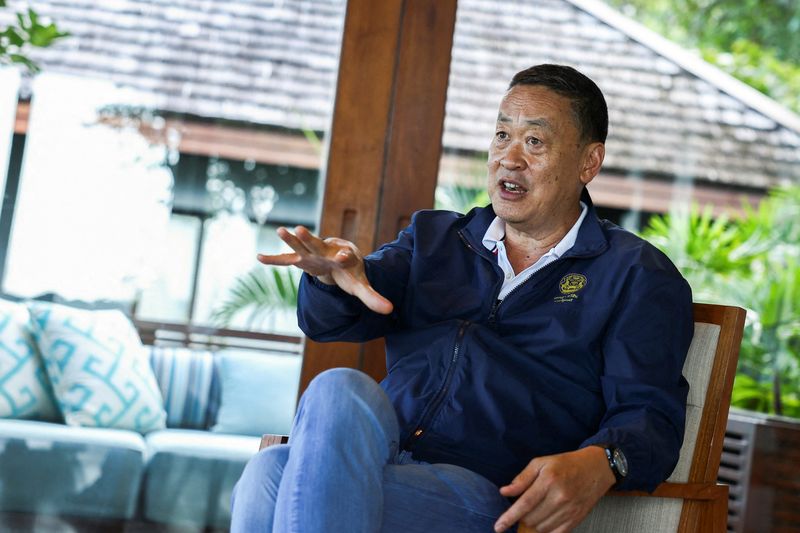
BANGKOK (Reuters) - Thailand's Prime Minister Srettha Thavisin on Tuesday said he had asked the country's four largest lenders to lower interest rates to help small businesses and the economy.
"Vulnerable groups like SMEs have a problem with a high interest rates ... I asked the four to consider interest rates," Sretta told reporters, adding Thai financial institutions were strong.
Thailand's four largest lenders are Bangkok Bank, Kasikornbank, Krungthaibank and SCBX.

LONDON (Reuters) - British Prime Minister Rishi Sunak will announce a 500 million pound ($617 million) uplift in military support for Ukraine on a visit to Poland on Tuesday, warning that Russia must be defeated to prevent its troops from pressing further into Europe.
Sunak's visit to Poland to meet Prime Minister Donald Tusk is his first international trip for months and is aimed at showing his restive party he is still in command before an election later this year he is widely expected to lose.
Britain has long been a vocal supporter of Ukraine, and the additional funding will take London's total military aid for this financial year to 3 billion pounds, just days after the U.S. House of Representatives approved a $60 billion package.
"Defending Ukraine against Russia's brutal ambitions is vital for our security and for all of Europe. If Putin is allowed to succeed in this war of aggression, he will not stop at the Polish border," Sunak said in a statement.
"Ukraine's armed forces continue to fight bravely, but they need our support - and they need it now. Today's package will help ensure Ukraine has what they need to take the fight to Russia," he said before the visit.
Britain will also send what it described as its largest-ever single package of equipment, including 60 boats, more than 1,600 strike and air defence missiles and nearly 4 million rounds of small arms ammunition.
With Russia making some gains, Ukrainian President Volodymyr Zelenskiy has urged countries to help Kyiv get the long-range arms and air defence systems he says are needed to turn the tide.
In Poland, Sunak will meet Tusk, who as European Council president was outspoken over Britain's decision to leave the European Union, for the first time in person to discuss not only security but also deepening trade ties. ($1 = 0.8102 pounds)
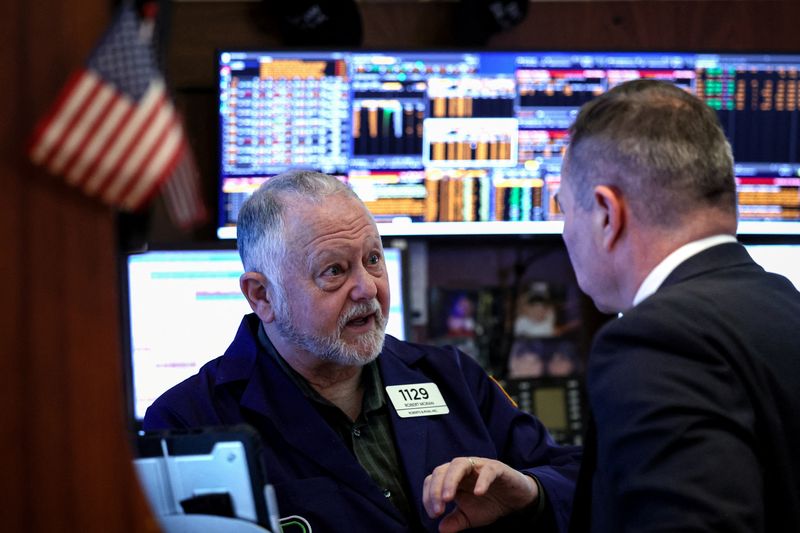
By Chibuike Oguh
NEW YORK (Reuters) -Wall Street stocks ended higher on Monday following a market sell-off in previous sessions as investors eyed a busy week for quarterly results from key companies that would provide a glimpse of the U.S. economy's health. The benchmark S&P 500 and the Nasdaq rebounded from a decline over the past six sessions which had been caused by investors re-evaluating their expectations on interest rate cuts in the wake of strong economic data, geopolitical tensions, persistent inflation and commentary from Federal Reserve officials.
All 11 S&P 500 sectors closed higher, with technology and financial stocks leading gains. Markets were gearing up for quarterly results from megacap companies this week, including some of the so-called Magnificent Seven stocks such as Tesla (NASDAQ:TSLA), Meta Platforms (NASDAQ:META), Alphabet (NASDAQ:GOOGL) and Microsoft (NASDAQ:MSFT). "I think it's just standard buy-on-the-dip after a 5% pullback that kind of wakes people up to put money to work," said Lamar Villere, portfolio manager at Villere & Co in New Orleans. "Investors are looking ahead to this week with hugely significant earnings coming out and with concerns about what the Fed is doing with pushing back any rate cuts," Villere added. Money markets are pricing in only about 41 basis points (bps) of rate cuts this year, down from about 150 bps seen at the beginning of the year, according to LSEG data. In addition to top corporate earnings, markets are also awaiting the release later this week of the March personal consumption expenditure (PCE) data - the Fed's preferred inflation gauge - to further ascertain the trajectory of monetary policy.
3rd party Ad. Not an offer or recommendation by Investing.com. See disclosure here or remove ads .
Fed policymakers are in a media blackout period ahead of their policy meeting on May 1.
The S&P 500 gained 43.37 points, or 0.87%, to 5,010.60 and the Nasdaq Composite gained 169.30 points, or 1.11%, to 15,451.31. The Dow Jones Industrial Average rose 253.58 points, or 0.67%, to 38,239.98.
Megacap growth stocks ended higher, with gains in Alphabet, Amazon.com (NASDAQ:AMZN) and Apple (NASDAQ:AAPL) between 0.5% and 1.5%. Nvidia (NASDAQ:NVDA) gained 4.4% to rebound from a 10% drop in the previous session.
"This is predicated on positive technical expectations on tech earnings and traders not wanting to be short in front of it, and the PCE numbers later this week that people are somewhat sanguine about as well," said Thomas Hayes, chairman of hedge fund Great Hill Capital in New York.
Tesla shares dropped 3.4% as the electric vehicle maker cut prices in a number of its major markets, including China and Germany, following price reductions in the United States.
Cardinal Health (NYSE:CAH) fell 5% after the drug distributor said its contracts with UnitedHealth Group (NYSE:UNH)'s OptumRx, one of its largest customers, will not be renewed when they expire at the end of June.
Advancing issues outnumbered decliners by a 2.87-to-1 ratio on the NYSE. There were 49 new highs and 76 new lows on the NYSE. On the Nasdaq, 2,682 stocks rose and 1,499 fell as advancing issues outnumbered decliners by a 1.79-to-1 ratio.
The S&P 500 posted 9 new 52-week highs and 4 new lows while the Nasdaq recorded 40 new highs and 184 new lows.
3rd party Ad. Not an offer or recommendation by Investing.com. See disclosure here or remove ads .
Volume on U.S. exchanges was 10.33 billion shares, compared with the 11.03 billion average for the last 20 days.
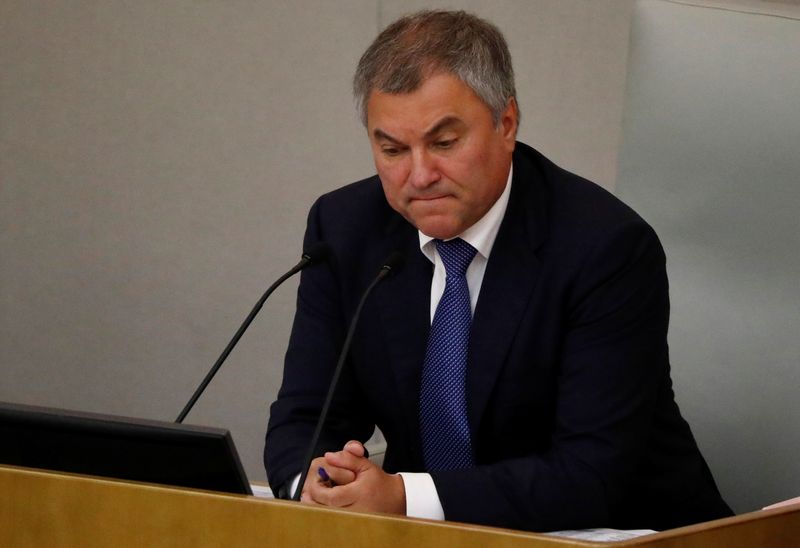
MOSCOW (Reuters) - Russia now has grounds to confiscate Western assets after the U.S. House of Representatives passed legislation that would allow the potential transfer of seized Russian assets to Ukraine, a top Russian lawmaker said on Monday.
"Washington has passed a law on the confiscation of Russian assets in order to provoke the EU to take the same step, which will be devastating for the European economy," Vyacheslav Volodin, the Duma speaker and close ally of President Vladimir Putin, said.
"Our country now has every reason to make symmetrical decisions in relation to foreign assets," said Volodin.
Volodin said that of the $280 billion of Russian assets frozen abroad, only $5 to $6 billion was in the United States while about 210 billion euros ($224 billion) was in the European Union.
NBC said the House passed the "REPO Act" which would allow the administration of U.S. President Joe Biden to confiscate billions of dollars’ worth of Russian assets sitting in U.S. banks and transfer them to Ukraine for reconstruction.
($1 = 0.9377 euros)
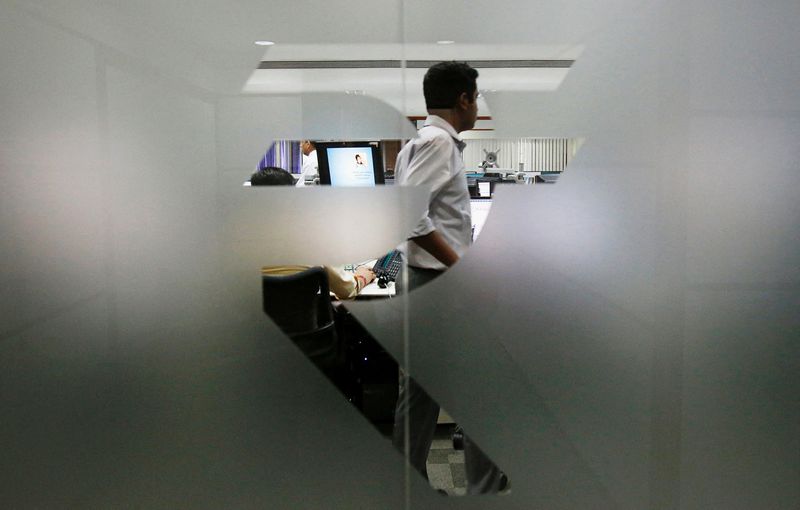
By Dharamraj Dhutia and Nimesh Vora
MUMBAI (Reuters) - India's rupee and government bonds will move this week based on developments in the Middle East crisis as well as a key U.S. inflation gauge that will impact the interest rate outlook.
The rupee dropped to a record low of 83.5750 to the U.S. dollar on Friday amid worries over a wider conflict in the Middle East and expectations that U.S. interest rates are likely to remain higher for longer.
The currency fell 0.1% in the week to end at 83.47, and the losses would have been larger had it not been for the Reserve Bank of India's (RBI) intervention.
The rupee should trade in a 83.25 to 83.75 range this week, traders said.
Emerging market currencies have come under pressure on concerns of a wider fallout of the Israel-Iran skirmishes.
"I would think that if there is more negative news on Middle East, RBI would be intervene heavily again based on how it has been in recent days," Kunal Kurani, associate vice president at Mecklai Financial, said.
The hawkish tone of Federal Reserve policymakers has prompted investors to dial back interest rate cut expectations.
U.S. core personal consumption expenditures price index, the Fed's preferred inflation measure, is due on Friday and will be watched for cues on the rates path ahead of a policy decision next week.
Meanwhile, the 10-year Indian government bond yield ended at 7.2278% on Friday, gaining 5 basis points in the week, after rising 11 bps in two previous weeks.
Traders expect the benchmark bond yield to move in a 7.16%-7.27% range this week.
Bond yields have been on an uptrend, tracking upward trajectory in U.S. yields as well as oil prices.
Treasury yields have risen as markets are now expecting fewer than 50 basis points of rate cuts in 2024.
Still, the recent rise in Indian bond yields has investors scouting for value as yields are seen easing later this year despite the local central bank holding rates, treasury officials have said.
"The benchmark bond yield may not rise much above 7.23%-7.25% levels," VRC Reddy, treasury head at Karur Vysya Bank said.
DBS Bank expects the benchmark yield to slip below 7% in July-December. As Indian government bonds have "low beta" to global bond movements, it is a good diversification trade for international debt market investors, the bank said.
KEY EVENTS: ** U.S. April S&P Global manufacturing, services and composite PMI - April 23, Tuesday (7:15 p.m. IST)
** U.S. March new home sales - April 23, Tuesday (7:30 p.m. IST) ** U.S. March durable goods - April 24, Wednesday (6:00 p.m. IST)
** U.S. initial weekly jobless claims week to April 15 - April 25, Thursday (6:00 p.m. IST)
** U.S. January-March advance GDP - April 25, Thursday (6:00 p.m. IST) (Reuters poll 2.1%) ** U.S. March personal consumption expenditure, core PCE index - April 26, Friday (6:00 p.m. IST)
** U.S. April U Mich sentiment - April 26, Friday (7:30 p.m. IST)

LONDON(Reuters) - Prices of homes being sold in Britain are close to their record highs after the biggest annual increase in a year, according to an industry survey that suggested the momentum in the housing market of early 2024 extended into April.
Property website Rightmove (OTC:RTMVY) said on Monday its asking prices for residential properties rose by 1.7% in the four weeks to April 13 when compared with the same period last year.
Prices sought by sellers rose by 1.1% in month-on-month terms, slowing from a 1.5% increase in the previous four weeks.
The average new seller asking prices of 372,324 pounds ($463,320) was only 570 pounds of a record hit in May 2023, Rightmove said.
Other measures of Britain's housing market have also shown a recovery in demand and prices, helped by a fall in borrowing costs which surged in 2022 when former Prime Minister Liz Truss's plans for sweeping tax cuts upset financial markets.
Rightmove said the number of new sellers was 12% higher than a year earlier and the number of sales was up by 13%. Demand was strongest in the high-end segment where asking prices in 2024 so far are up by the most since 2014.
Demand for properties typically sought by first- and second-time buyers - who are typically more mortgage-dependent rose by less, the survey showed.
"Despite the current optimism, these are not the conditions to support substantial price growth," Tim Bannister, Rightmove's director of property science, said.
"Sellers who are keen to secure their sale will still need to price realistically for their local market and avoid being over-ambitious."
($1 = 0.8036 pounds)

By Amy Lv and Tony Munroe
BEIJING/SINGAPORE (Reuters) -U.S. President Joe Biden's push to triple tariffs on Chinese steel imports strikes a mostly symbolic blow on an industry facing bigger concerns over faltering local demand and threats of even stronger blowback against China's surging exports.
Steel consumption in the world's second-largest economy is poised to shrink again this year as a protracted property crisis has yet to find bottom and as infrastructure demand growth slows after 12 indebted regions were ordered to halt certain projects.
The state-backed China Metallurgical Industry Planning and Research Institute (MPI) forecasts a 1.7% drop in China's steel demand this year, following a 3.3% decline in 2023.
While China's steel exports last year climbed more than a third to their highest since 2016 at 90.26 million metric tons, about 9% of its total crude steel output, just 598,000 tons of the shipments went to the United States. That was down 8.2% from volumes shipped to the U.S. the previous year and less than 1% of total Chinese steel exports worth $85 billion in 2023.
China, the world's biggest producer and exporter of steel, is just the seventh-largest shipper of steel to the U.S., softening the blow of Biden's proposal to raise to 25% the tariffs imposed by his predecessor Donald Trump on certain steel and aluminium products.
"We do not think there will be any big impact as the main destinations for China's steel exports are Japan, South Korea, and Middle East countries," said an analyst at a China-based steel trader who declined to be named as he was not authorised to speak with media.
Spurred by low local prices, Chinese steelmakers and traders are on track to match or surpass last year's exports, with domestic information provider Lange Steel lifting its forecast to more than 100 million tons for 2024 after March shipments beat expectations.
China's cheap steel products are also stoking complaints from beyond the United States.
Late last year, India imposed anti-dumping duties on some Chinese steel imports while Mexico announced a nearly 80% tariff. Thailand has launched a probe into Chinese rolled steel imports, and Brazilian steelmakers are urging their government to impose a 25% tariff on imports.
A report from a Chinese state-backed research agency identified a total of 112 statements from countries regarding anti-dumping and anti-subsidy moves on Chinese steel products in 2023, a rise of around 20 from 2022.
"We are expecting more trade frictions this year," said David Cachot, research director at consultancy Wood Mackenzie.
DOMESTIC DOLDRUMS
Beijing's latest support for the sector, a plan to back equipment upgrades in the industrial and farm sectors and speed consumers' replacement of cars and home appliances, is unlikely to fully offset reduced steel consumption from the property sector.
Consultancy CRU Group forecast that an additional 8 million to 9 million tons of steel demand will be created over the next four years thanks to the policy. In comparison, the state metallurgical institute expects construction demand to decline 20 million tons, or 4%, this year.
Some analysts said they expect infrastructure-led steel consumption this year to grow just 1% to 2%, from previous expectations of 7% to 8%, after Beijing's demand that a dozen regional governments delay or halt some state-funded infrastructure projects prompted other regions to follow suit.
In recent years, Beijing has imposed caps on steel production both to reduce supply and curb carbon emissions, and industry watchers and insiders say further output cuts are needed to curtail overcapacity.
"The steel industry faces a conspicuous contradiction -strong supply capability and dwindling demand," Luo Tiejun, vice chairman of state-backed China Iron and Steel Association (CISA), told an industry event this week in southern China.
"The key to address this is that leading producers take the lead in reining in production pace based on demand," Luo said, according to the group's WeChat account.
EXPORTS TO THE RESCUE?
In March, Chinese steel exports climbed to 9.89 million tons, the highest for a month since July 2016, bringing the first-quarter total to 25.8 millions even as overall exports in the world's second-largest economy contracted sharply.
Valued at $20.3 billion, China's first quarter steel exports averaged $789 per ton, far above local prices averaging 4,145 yuan ($572.30), data from customs and consultancy Mysteel show.
A weaker-for-longer yuan against the U.S. dollar, partly due to delayed U.S. Federal Reserve interest rate cuts, is also expected to facilitate steel exports.
But exports are susceptible to uncertainty stemming not only from trade frictions but also growing overseas supply and the potential for Beijing to mandate output limits.
To be sure, global steel demand is expected to rise 1.7% to 1.793 billion tons this year, the World Steel Association said.
"Although some countries are building their own capacity to fulfil the increase in local demand, this cannot meet the demand quickly enough, which means that there is still room for steel from China," said Kevin Bai, a Beijing-based analyst at CRU Group.
($1 = 7.2426 yuan)
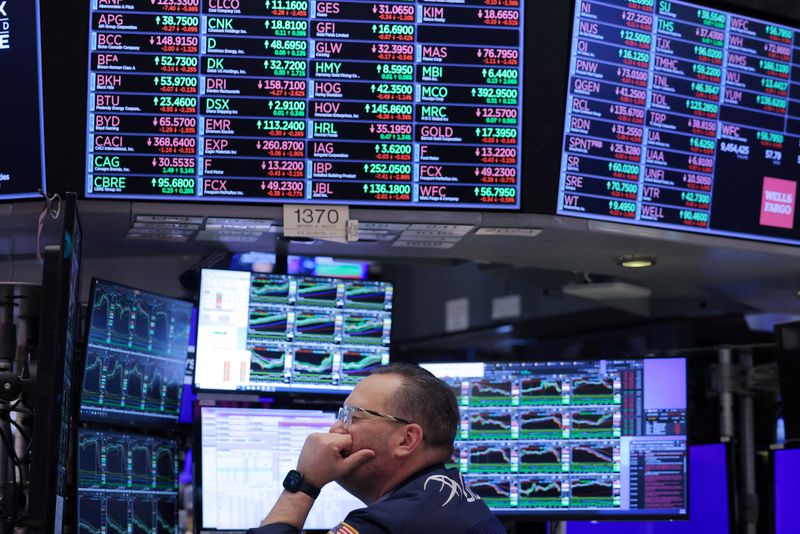
Investing.com -- Earnings from the big tech names and another round of inflation data are due in the coming week, as a rally in U.S. stocks appears to be running out of steam partially due to worries that interest rates are likely to remain higher for longer. Here’s what you need to know to start your week.
U.S. inflation figures
Investors also get another look at U.S. inflation data on Friday with the personal consumption expenditures (PCE) price index, the Federal Reserve’s favoured inflation gauge, which economists expect to remain elevated in March.
Recent data indicating that progress on taming inflation has stalled, along with strong labor market data, geopolitical tensions in the Middle East that have sparked a rise in oil prices, and comments from Fed officials including Chair Jerome Powell have prompted investors to dial back expectations on the timing of any rate cuts.
Other economic data for the week includes an initial estimate of first quarter GDP, which is expected to have moderated slightly from the previous quarter. Data on new home sales and initial jobless claims will also be released along with revised figures on consumer sentiment and inflation expectations.
Big tech earnings
Big tech earnings are due are due to start arriving in the coming days after a week which saw the S&P 500 and the Dow Jones Industrial Average register their largest weekly percentage losses since March 2023, and the Nasdaq post its largest weekly drop since November 2022.
While first-quarter reporting season is still in its early stages, expectations have dimmed. Analysts now see aggregate S&P 500 earnings growth of 2.9% year-on-year, down from the 5.1% estimate on April 1, according to LSEG data cited by Reuters.
Four of the so-called Magnificent Seven group of tech giants will report - electric vehicle maker Tesla (NASDAQ:TSLA) on Tuesday after the market closes, Facebook-parent Meta (NASDAQ:META) on Wednesday, followed by Microsoft (NASDAQ:MSFT) and Google-parent Alphabet (NASDAQ:GOOGL) on Thursday.
Big tech is crucial to the S&P 500 as these companies hold the largest weightings in the index.
Oil prices
Oil settled slightly higher on Friday, but posted a weekly decline, after Iran downplayed Israel's retaliatory drone strike on its soil, indicating that an escalation of hostilities in the Middle East might be avoided.
As oil's risk premium gradually unwound, prices fell around 3% last week. Both benchmarks posted their biggest weekly loss since February.
Investors, however, are not ruling out the possibility that Middle Eastern tensions will disrupt supply.
Meanwhile, reports Friday said the International Monetary Fund expects OPEC+ to begin increasing oil output from July.
OPEC+ members, led by Saudi Arabia and Russia, last month agreed to extend voluntary output cuts of 2.2 million barrels per day (bpd) until the end of June. That has helped keep oil prices elevated.
PMI data
Investors will be closely watching PMI data out of the Eurozone the U.S. and the UK on Tuesday for any signs that inflation, especially in the services sector, is returning.
The March U.S. PMI showed U.S. services industry growth slowed further last month, along with services inflation.
The PMI figures could also indicate that the Eurozone economy is rebounding after March PMI data showed activity stabilizing and services inflation easing, keeping the European Central Bank on track for a widely expected June rate cut.
BOJ meeting
Investors will be on the look-out for clues on timing of the next rate hike when the BOJ releases fresh quarterly growth and inflation forecasts at its policy meeting on Friday.
BOJ Governor Kazuo Ueda said on Friday the central bank "very likely" will raise interest rates if underlying inflation continues to go up and begin reducing its huge bond buying at some point in the future.
The remarks reinforced expectations the central bank will raise its short-term interest rate target from the current 0-0.1% range sometime this year.
The yen has been declining since the BOJ's decision last month to end eight years of negative interest rates, as markets focused on its dovish guidance signalling that borrowing costs will be stuck around zero for some time.
(Reuters contributed to this report

By David Lawder
WASHINGTON (Reuters) - The World Bank Group on Thursday unveiled a new goal to help countries deliver affordable healthcare to 1.5 billion people by 2030 by expanding services to remote areas, cutting fees and other financial barriers and focusing on lifetime care.
The development lender said it would deploy financing, its own health expertise and new partnerships with private-sector firms, non-governmental organizations and civil society groups in reaching the target, which it defines as a person receiving treatment by a health care worker through an in-person visit or a telehealth appointment.
The World Bank estimates about 2 billion people around the world face severe financial hardship when paying for health services. This is being exacerbated by climate change, pandemics, conflicts, societal aging, and a projected shortfall of 10 million healthcare workers by 2030, it said.
"Providing a basic standard of care for people throughout their lives is critical for development," World Bank President Ajay Banga said in a statement. "This ambition won't be realized with a solo effort. It will require partners, a coalition of public and private sector, working together to expand access to healthcare services."
The World Bank said financing from its International Development Association fund for the poorest countries will aim to bring healthcare workers into communities where people may otherwise have no access to services.
In middle-income countries, the World Bank said its International Bank for Reconstruction and Development will deploy financing to incentivize government investments in health and regulations that provide market certainty and can attract private-sector investment, including in pharmaceuticals and medical equipment.
The World Bank added that Japan is launching a knowledge hub on its universal healthcare system aimed at enhancing other healthcare ministries' capacity and expertise, an initiative supported by the World Bank and the World Health Organization.

